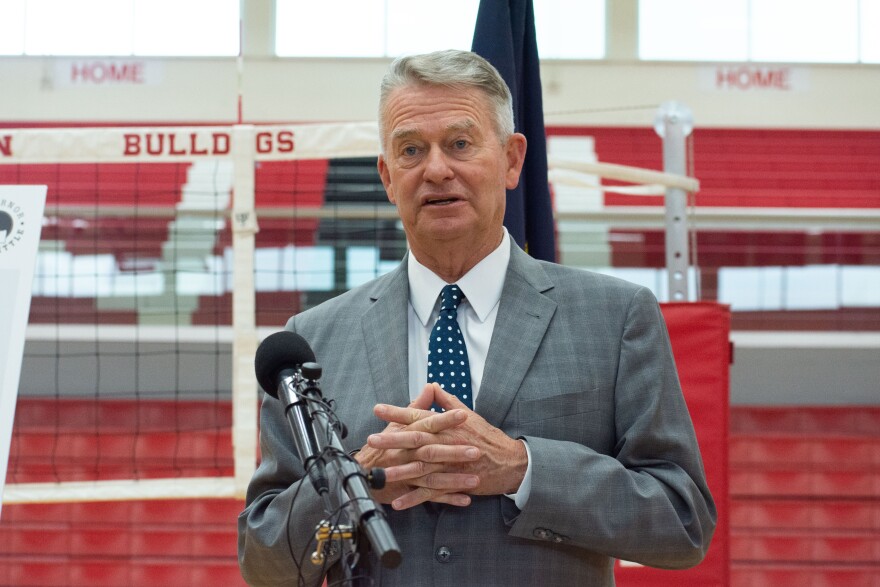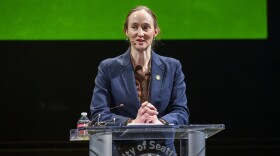Idaho Gov. Brad Little is hoping to fend off primary challenges from the far-right Tuesday as he seeks a second term in office.
Little, a longtime establishment political figure in the state, faces his second-in-command, Lt. Gov. Janice McGeachin, as well as a handful of other Republican hopefuls.
McGeachin, who's been endorsed by former President Donald Trump, promises to ban private businesses from implementing vaccine mandates and promotes private militias.
"The ideal situation is for local militias to work hand in hand with local sheriffs, who will deputize and utilize militia members as needed," she writes on her campaign website.
McGeachin has long had ties with militia members and sparked outrage when she appeared in a recorded speech played at the America First Political Action Conference.
When asked by a local television anchor if she knew AFPAC's organizer, white nationalist and Holocaust denier Nick Fuentes, McGeachin said she did not.
She said that Fuentes' past comments, which she said she hadn't heard, "[do] not reflect on who I am or who the thousands of others that are participating in this movement."
Commenters heckled her, writing messages in all capital letters like, "people ask why we don't want women in politics," and urging her to "go back in the kitchen." Others claimed she wore a shirt with symbols related to the radical, debunked conspiracy theory Pizzagate.
McGeachin also associates with other far-right figures, including Michelle Malkin, who has defended the internment of Japanese-Americans in WWII and who she says asked her to submit a video to AFPAC.
Arizona state Sen. Wendy Rogers, who has endorsed McGeachin, suggested on Saturday that the deadly shooting in Buffalo, N.Y., was orchestrated by the feds. Police say the 18-year-old suspect sought to kill Black people in the attack and touted racist ideology in a screed posted online.
In Idaho, the governor and lieutenant governor don't run on the same ticket.

The relationship between Little and McGeachin has been tenuous at best over the past two years. At one point in the early days of the pandemic, the two hadn't spoken for weeks.
"Well, it doesn't make it easier. I can tell you that," he told Boise State Public Radio when asked how the two could have an effective working relationship without speaking to each other.
In May 2020, she, along with other politicians, visited a brewery in north central Idaho that opened in defiance of Little's reopening plan.
Since then, McGeachin has repeatedly clashed with the governor.
She issued two executive orders while acting as governor when Little was out of state — one banning mask mandates, which were never issued statewide, and another barring governments from implementing COVID-19 vaccine or testing mandates.
The governor immediately repealed them, saying McGeachin had subverted his authority.
Fueled by outrage over public health mandates, the number of far-right activists and politicians surged in Idaho over the past two years alongside waves of COVID-19 that stretched hospital capacity here near its breaking point.
Few in Idaho have had to endure such a backlash over the response to the pandemic more than Little and this election has become a referendum on his handling of the coronavirus outbreak.
He was the first Republican governor in the West to issue a stay-at-home order in March 2020 and faced immediate pushback from members of his own party.
Some even compared his actions to those of Adolf Hitler and the Holocaust.
But by mid-June 2020, Little relinquished control over the state's pandemic response to Idaho's seven regional public health districts. He never imposed a statewide mask mandate and signed an executive order banning vaccine passports.
After Idaho's campaign failed to convince nearly half the state to get fully vaccinated, Little instead embraced its white-hot economic recovery partially built on state budget cuts in the early days of the pandemic.
Little recently announced April's tax revenue more than doubled analysts' forecasts and tees up a projected $1.3 billion budget surplus for the current fiscal year.
In a press release last week, he vowed to put more money back in Idahoans' pockets on top of record-setting tax cuts made in the last two years.
Other far-right candidates are following McGeachin's lead by seeking statewide office in the Republican Party primary.
For attorney general, Congressional Freedom Caucus co-founder Raul Labrador has outraised and outspent Lawrence Wasden, the state's incumbent AG.
State Rep. Priscilla Giddings, who was censured last year by her House colleagues for sharing the name and photo of a rape victim on her Facebook page, wants to succeed McGeachin as lieutenant governor.
Two state lawmakers, Dorothy Moon and Mary Souza, who both falsely insist that President Biden lost the 2020 presidential election, want to become Idaho secretary of state. The office oversees elections, among other duties.
Stephen Heidt, who works at Idaho's largest prison complex, is the only Democrat listed on Tuesday's ballot. Shelby Rognstad, mayor of the resort community of Sandpoint, failed to register as a Democrat during the filing period and has undertaken a write-in campaign.
Copyright 2022 Boise State Public Radio News. To see more, visit Boise State Public Radio News. 9(MDAyNTQ1NzQ1MDEyMjk0OTcxNTI4MzljZQ001))







